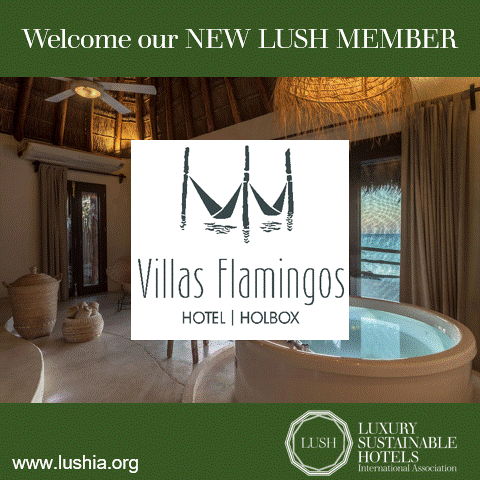Switched-on global citizens are leaning towards booking green hotels over others that are not eco-friendly. 47% will pay more for a sustainable product.

Today I have the pleasure of sharing this interesting talk with Jose Manuel Delgado on sustainable tourism and best practices at the Caribbean. He´s the General Manager at Villas Flamingos, a beautiful luxury boutique hotel located at amazing Holbox island, in Mexican Caribbean. This little island is, indeed, one of my most beloved places in Mexico.
Villas Flamingos is a boutique hotel on the beach with 40 rooms, all with partial or total views of the sea, it also has a beach extension of 180 linear meters of coastline. The decoration, simple and sophisticated at the same time, is inspired by island life: bright colors, beach details, paintings on the walls that reflect the beauty of this place in the Mexican Caribbean.
 |

Mr Jose Manuel Delgado and Mr Hector De Castro. Photo by LUSH assoc., 2022
1. Jose Manuel, do you consider sustainability has become a marketing tool or do you really perceive a change in the industry?
I honestly think both. Although many more changes and evolution are still necessary. The future is undoubtedly linked to the use of renewable energies to minimize carbon footprint.
2. In your opinion, what makes a hotel truly sustainable?
For a hotel to be sustainable, the company’s vision must be aligned with sustainability and the interest in conserving natural resources, promoting respect for the environment and promoting local economic activities.
3. What kind of experiences are VILLAS FLAMINGOS guests looking for?
The guest who visits Villas Flamingos seeks to forget about everything, get closer to themselves and nature, rest, relax, pamper themselves and above all seeks to find unique, original, totally personalized experiences closely linked to local culture and gastronomy.

4. What differences do you perceive between Spanish, Mexican and North American tourists when it comes to eco-luxury?
When we talk about customer profiles in search of eco luxury, we find marked differences between Spanish, Mexican and American tourists, especially in terms of their consumption habits, their expectations and their previous experience in this type of tourism.
5. What actions is VILLAS FLAMINGOS undertaking or implementing to promote sustainability in its facilities?
We are currently about to finish a majestic project that will become the flagship of our hotel. We are talking about our new lobby, built mainly of bamboo, made up of immense domes and that makes it unique and one of the largest in its category in all of Latin America. Bamboos grown on plantations tended by local Oaxacan farmers who promote the local economy are being used for manufacturing.

The future new lobby, built mainly of bamboo. Unique and, once finished it ‘ll be one of the largest in its category in Latam.
…and what about the environment?
Eco Hotel Villas Flamingos is championing a project in conjunction with CONAM for the conservation and development of coastal dunes in Holbox.

Villas

Amazing pool facing white sand beaches

VILLAS FLAMINGOS is a unique boutique hotel to enjoy and relax mind and body.



Beautiful bedrooms, natural materials, caribbean concepts and atmosphere, facing white sand beaches.
——————————-
6. How has VILLAS FLAMINGOS evolved after the COVID19 pandemic?
We have opted for excellence, personalization, attention to detail in all our operations to improve the customer experience. We carry out an improvement plan focusing on the renovation of rooms, services, facilities and we have opted for quality in our gastronomic offer and mixology.
We have replaced our buffet breakfast with a gourmet breakfast with many options and we have made our cancellation policies more flexible.
Regarding our sales strategy, we have relied heavily on social networks, creating a multitude of organic content that has allowed us to show the hotel as it is to our guests, future guests and those who have already become regular customers who cannot wait to visit this wonderful island of Holbox.
7. What news does VILLAS FLAMINGOS present for this summer?
For this summer we’ve launched a new weekly event, pre-Hispanic cuisine. It is a 5-course haute cuisine dinner where our Executive Chef Juan Uuh delights us with the best avant-garde pre-Hispanic cuisine with a Yucatecan character, in the same way we have a special ritual show at sunset to thank the universe for the beauty from Holbox.
8. Now that there have been recent elections in Quintana Roo, imagine that you are the Governor, what actions would you implement to promote sustainable tourism in the region and in Holbox island?
Without a doubt, promoting and reducing bureaucratic obstacles in search of energy self-sufficiency from renewable energies for hoteliers on the island.
9. Would you recommend to colleagues and experts to be part of the Luxury Sustainable Hotels Association (LUSH) community?
Additional groups focus on The Americas, Europe and Africa.

A word to hoteliers:
Ensure your company isn’t damaging customers’ trust by greenwashing – making false claims that your company or products are environmentally friendly.
- Greenwashing is when a company purports to be environmentally conscious for
- Marketing purposes but actually isn’t making any notable sustainability efforts.
- Companies can greenwash even when they have good intentions.
Recommeded reading: Greenwashing is not the solution,
by Hector De Castro, President at LUSH assoc and CEO at EcoHotelProjects
Reality: Darrell Wade, the co-founder and CEO of tour operator Intrepid Travel, said that at least 50 percent of travel companies haven’t taken concrete steps to addressing climate change. Another takeaway is that hotels and airlines, among other companies, need to establish science-based targets for carbon emissions reduction. Skift Senior Vice President of Research Haixa Wang said carbon offset purchases, popular in the travel industry, are rather ineffective.

If consumer demand for sustainability is the frontier of our transition to a greener, fairer, and smarter global economy, here are 6 basic brand greenwashing tactics to avoid.
- Embellished language: Don’t throw around words or terms with no clear meaning (e.g., “eco-friendly” or “natural”).
- Green products vs. dirty company: Watch out for hypocrisies, such as efficient light bulbs made in a factory that pollutes rivers.
- Evocative pictures: Don’t use branding images that give an unjustified green impression (e.g., flowers blooming from exhaust pipes).
- Designations that are just not credible: Look out for obvious attempts to “green” a dangerous product to make it seem safe.
- Imaginary friends: Don’t use a label that looks like a third-party endorsement but is actually made up.
- Inaccuracies: Never use totally fabricated claims or data.
Transparency and corporate social responsibility
“Greenwashing is actually in a corporation’s best interest,” said Deandra Jefferson, former office manager for a sustainability organization that she requested go unnamed, in an interview with business news daily. “although the concept of corporate social responsibility exists.”
In other words, greenwashing benefits a corporation only when it successfully deceives its customers. Transparency can bridge the gap between artificial and genuine concern for the environment.
One example of transparency is activist outdoor clothing retailer Patagonia. Unlike most companies, Patagonia doesn’t sugar-coat its use of chemicals or the fact that it leaves a footprint. The company’s sustainability mission is described as a “struggle to become a responsible company.”
Your actions today will impact future generations’ quality of life.
